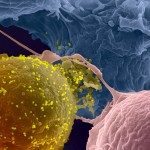Lien vers Pubmed [PMID] – 12692233
J. Virol. 2003 May;77(9):5313-23
DC-SIGN, a lectin expressed on dendritic cell and macrophage subsets, binds to human immunodeficiency virus Env glycoproteins, allowing capture of viral particles. Captured virions either infect target cells or are efficiently transmitted to lymphocytes. Cellular mechanisms underlying the effects of DC-SIGN remain poorly understood. Here we have analyzed the effects of DC-SIGN on viral entry and on syncytium formation induced by Env glycoproteins. The lectin enhanced susceptibility to viral infection and dramatically increased virion internalization. Captured virions accumulated in the vesicular pathway, and their access to the cytosol was altered. Strikingly, the presence of DC-SIGN on target cells inhibited their ability to form syncytia with Env-expressing cells. However, increasing CD4 surface levels on target cells alleviated this inhibitory effect of DC-SIGN. Moreover, the potency of the viral fusion inhibitor T-20 was not affected in DC-SIGN-expressing cells. Altogether, our results indicate that DC-SIGN exerts subtle and complex effects during early steps of HIV type 1 replication. DC-SIGN facilitates capture and accumulation of viral particles in a vesicular compartment and inhibits viral fusion. Competition between CD4 and DC-SIGN for Env binding likely affects virus access to the cytosol and syncytium formation.

